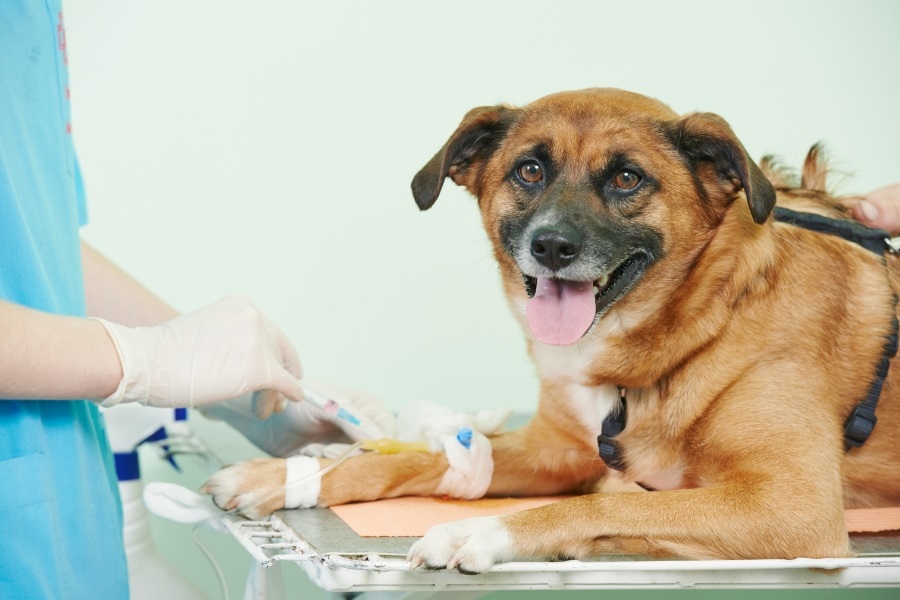Caring for a loved one with cancer is an all-consuming and emotionally filled journey. Ask any animal lover, caring for a pet diagnosed with cancer is no different. Learning, understanding and employing treatment options and therapies are the first line of defense in caring for your recently diagnosed companion animal.
Get Educated
Knowing and understanding your pet’s diagnosis makes a difference in your informed decision-making ability moving forward. Questions to consider asking your veterinary professional in the early diagnostic stages include:
- What type and stage of cancer does my pet have?
- What is my pet’s prognosis?
- What are the immediate and long-term decisions I need to be thinking about?
- What is the goal of treatment for my pet?
Understanding Established Treatment Protocols:
Caring for pets diagnosed with cancer means understanding established treatment options available including:
- Surgery is often seen as the first line of defense in fighting cancer. While complete tumor removal is the ultimate goal, lesions that cannot be surgically removed or may partially remain can be treated as well.
- Chemotherapy can serve to shrink existing tumors and involves administering drugs that attack new or growing cells. The type of chemo, and length of treatment depends on the type of cancer and progression of the disease.
- Radiation therapy uses high energy waves that come from specialized machines designed to tightly target the cancer site. “Radiation is an effective treatment for many types of cancers in almost any part of the body and can be utilized alone or in combination with chemotherapy and surgery.”
When Traditional Treatments Are Not an Option
When traditional treatments may not be an option, managing your pet’s pain and suffering and extending quality of life become the focus. A collaborative palliative care plan designed together with you and your veterinary professional will help you in defining specific care options afforded to your animal.
A cancer diagnosis brings a whole new dimension to the relationship with the animals we love. While it’s difficult to accept that our pets are vulnerable to cancer, the good news according to the American Veterinary Medical Foundation is that “pets today have a better chance of being successfully treated for cancer than they did before, thanks to advances in early recognition, diagnosis, and treatment.” Caring for a pet diagnosed with cancer is a challenging journey but one that can be navigated with courage in partnership with your veterinary professional at your side.
 Kindness and Quiet Help Everyone Enjoy the Office Entertainment Site Together
Kindness and Quiet Help Everyone Enjoy the Office Entertainment Site Together  Machine Learning with Excel: A Beginner’s Guide
Machine Learning with Excel: A Beginner’s Guide  Transforming Singapore’s Transport System The Ultimate Convenience of Promenade Peak
Transforming Singapore’s Transport System The Ultimate Convenience of Promenade Peak  Using CAGR Calculator for Business Revenue Forecasts
Using CAGR Calculator for Business Revenue Forecasts  Chencharu Close Condo Mix Development The Ultimate Address for Modern City Living with Exceptional Transport Links and Future-Ready Amenities
Chencharu Close Condo Mix Development The Ultimate Address for Modern City Living with Exceptional Transport Links and Future-Ready Amenities  How to Prevent Aches and Pains from Everyday Activities
How to Prevent Aches and Pains from Everyday Activities  Expanding Horizons Enrichment Centers and Special Education Institutions Near The Sen Condo
Expanding Horizons Enrichment Centers and Special Education Institutions Near The Sen Condo  How Commercial Cleaning Enhances the Environment in Toledo’s Dental Labs
How Commercial Cleaning Enhances the Environment in Toledo’s Dental Labs  Here’s Why a UAE Trade License is the First Step to Business Success
Here’s Why a UAE Trade License is the First Step to Business Success 




